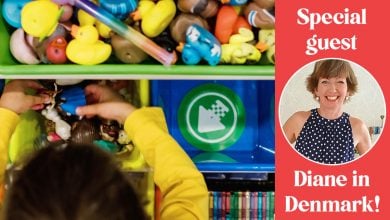
Which parenting books harmonize with your approach?
With so many opinions and advice out there about parenting, how do you know which parenting books are worth your time?
In this episode, Carol and Anne share their top parenting books that can work together with child whispering. When you know your child’s unique Type, you’re also better able to select books for the Type of child you’re raising. Listen for their top recommendations.
This episode’s Parenting Practice
Listen to the episode and pick a parenting book that you feel drawn to read. Or if it’s been a while, open up The Child Whisperer or listen to the audio version in your car or while you’re out for a walk. Continue putting into practice ideas and ahas that come, so you can do your best job as a parent.
Transcript of podcast episode
Carol: Welcome to The Child Whisperer Podcast. I’m your host, Carol Tuttle, author of the best-selling parenting book, The Child Whisperer. I’m with my co-host, Anne Tuttle Brown.
I’m grateful that one of your favorite parenting books is The Child Whisperer, and of course it’s not the only book out there that’s going to help you as a parent. There’s some really popular titles that have been great companion book that really support the methodology of The Child Whisperer, where too often a parenting book is speaking in such general terms. They don’t consider that not all children will respond favorably.
So we have our own list of parenting books we think are a great complement to how you’re parenting using child whispering approaches and also we reached out to our fan base on The Child Whisperer Facebook group and asked them what books they’ve found favorable that are a good pairing up with a child whispering approach.
Anne: I feel like reading The Child Whisperer as well, lets you in understanding what Type your child is, can guide you while you…
Carol: With any parenting book.
Anne: Yes. And you can know what books to put down that maybe are like, “Oh I’m really having challenges with my Type 1, that book isn’t the right fit for me because I know what they’re needing.” And then also when you listen to a book you can be like, “Oh that approach won’t work but that one really well.” And you can relate to some of the stories.
Carol: You can line it up better.
Anne: So this, I’ve got some that are my personal favorites and some of them were mentioned as well and then we’ll share some that I haven’t read yet, but a lot were mentioned by our child whisperer parents on the Facebook group. So we’ll start out with the Love Languages for Our Kids
Carol: That’s the number one book that gets paired up with Energy Profiling, hands down.
Anne: Because it is a type of profiling system. There’s five love languages.
Carol: It’s a system that you choose which is your preference for getting needs met and what gives you feel that has value to you. It’s like a mechanism saying, if you do this for me, I know you care about me.
So it’s interesting is before people read this book they more often will approach others and showing their love true to their love language, which is very typical in the child whispering world as well.
Anne: So you can parent true to your Type.
Carol: You’re going to parent true to your Type, not your child’s Type and we help you straighten that all out. The one question I’m asked frequently is if there is a crossover exactly to the love language specific to one of each of the types like they’re paired up and I would say no. You’re going to see some common themes that certain love languages will be more prominent in certain types, but it’s not 100% crossover. So there’s gonna be variable there, that’s why I’ve never done anything that said, “If you’re this, if you’re Type 2, you’re always going to have this love language,” because that’s not the case.
Anne: Like for example, as a Type 3, physical touch could be big but that could also be Type 2 things or Type 3 acts of service, because you’re like, help me get my to-do list done. That’s showing a lot of love or words of affirmation. So yeah. And so they have the most part… This is a book by Gary Chapman. It’s his whole program and it has the main book is for adults but then he wrote one for kids as well. And when I say I read a parenting book, I usually mean I listened to one because that’s the way I can get through books the fastest. So I listened to this book and it’s kind of like a next level, like when you’ve got to know their type I feel like that is…
Carol: Like that’s foundational.
Anne: Foundational. And then this is like, oh this is how I can even cater it even more to really loving them.
Carol: Fine-tuning it.
Anne: And showing my love for them. So it was funny I asked Katie because I was trying to decide, “Well I feel like I’m one of those Types that can’t decide my Type because I still don’t know what my love language is.” I’m like, “Maybe it’s this or maybe it’s that.” I’m like, “Oh, I’m that person that’s like I’m all of the Types.” So anyways, when I was trying to figure out my kid’s types or excuse me…
Carol: Love languages.
Anne: Love languages, I was asking them some question. I said, “Katie, do you like when I give you hugs? Which would be physical touch. Do you like when I give you presents? Do you like when I spend time with you?” Asking…
Carol: You gave her examples, yeah.
Anne: Or, “Do you like when I tell you you’re awesome?” She’s like, “I like all of them as long as I’m with you.” She is the quality time.
Carol: Quality time. There you go.
Anne: I thought that was cute. But and it’s with her, she lights up when we’re doing like family time and she just gets…
Carol: Like, we’re going to go do an activity.
Anne: Even like a simple walk. So anyways, it was really fun kind of playing with it.
Carol: Yeah, because probably you would think of Type 3, just the kind of the stereotypical would be actually do something, get a result for us. It’s an action and you’re like, “No, that’s not the case.”
Anne: It’s doing stuff together. There you go. All right. The next book that was mentioned multiple times is How to Talk So Your Kids Will Listen and Listen So Your Kids Will Talk. And that’s a really long title. I always love saying it.
Carol: I know. And it’s been out for quite a while.
Anne: It has. It’s been a long time and this book was so good. It was like a lightbulb moment after lightbulb moment.
Carol: But again, it builds on knowing your child type.
Anne: And for me, honestly, it was a lot of like duh moments like, “Duh, why am I not doing that already?”
Carol: Sort of being practical.
Anne: Yeah, or you’re just like listening or not pretending as a parent you have all of the answers or like shutting your kids down. And one of my favorite practices that they teach is when you’re having an issue with your child, sit down, write down all the possible solutions. Don’t shut down any ideas. And like you come together and decide. And so they have one for toddlers as well, but I felt like I listened to both of them, but just the main one, “How to Talk So Your Kids Will Listen and Listen So Your Kids Will Talk” will apply to any age. Just start with that one. I loved it.
Carol: The toddler one helps you with more of the languaging of it.
Anne: It basically just changes the way you talk and listen to your children and then, again, you can cater it to their type.
Carol: Got more child whisper coming up right after this brief message.
Woman: Knowing your Type and your child’s Type changes everything, doesn’t it? It helps you to understand one another better. It can help your outside too. When you wear clothes that express your type, you feel better, you look better and people understand you more easily including your kids. Carol Tuttle created the Dressing Your Truth program to help you dress true to your type and create a personal style that expresses who you really are. The best part, you can learn all the basics for free. Start loving how you look and feel at dressingyourtruth.com.
Anne: Another book that I listened to, this was my most recent listen, was at the beginning of this year 1-2-3 Magic by Thomas Phelan and it was a game-changer for me. This is about I think this is really good for Type 1 and Type 2 parents that are maybe a little bit more softies…
Carol: Pushover, softies, easily manipulated
Anne: With strong, determined children. And it’s a very easy approach to discipline that helps you be very still loving but very firm. It t helps the parents to be in charge, be consistent and the kids know what to expect. It’s a pretty easy practice. Basically, your kids have three tries and then they go to timeout if they don’t meet… It’s like, okay duh but like getting the stories, knowing the approach, having that like coach behind you being like, “You can do this.”
Carol: It’s not a new idea just so you know. The whole countdown method has been around for a long time as far as saying, “Okay, that’s one, that’s two.” It’s the follow-through that’s the key. That you will deliver the consequence that they’re aware of. If they get to three and they see my parent means business and I don’t want to deal with the consequence. So that’s the key in this one. There’s no magic in the numbers…
Anne: The result is the magic.
Carol: It’s what follows those numbers.
Anne: No. So, there’s a couple big takeaways for me was be non-emotional about it. If your kid’s doing something, having annoying behaviors is what they call it, you say, “That’s one.” You’re not like, “I told you to stop.” You’re not getting into it with them.
Carol: Right. You’re not using emotion to get them to change their behavior.
Anne: And you’re not trying to reason it out with them. And so if when I started this and he says, “You will have one of two kinds of children in their response. One who just goes along with it, okay, this is the new way mom’s doing things or on the other side you will have the like, you are not doing this. No, I’m not playing this game.”
And I knew Sam, my Type 2 was going to be like, “Okay mom.” And my Type 3 would be like, “What are you doing?” Like, push back. And I started, this was like maybe a couple of days into it and I said, “Katie, that’s one.” And she said, “Mom, you know, if you keep doing that then I’m not going to like you very much.” I was like, “That’s two.” And anyways…
Carol: Did she get to three on any of them ever?
Anne: No. And actually the result of getting to three and then you put them in their room for the seven minutes. You don’t make it a big to do. Just go to your room, you can play with your toys, whatever. You just need to remove yourself. And it was like she came out a whole new person. I was like, shh. Kids like this consistency. They want to know who’s in charge, they want to know parameters. This is supportive.
Carol: They want to know who they can trust and who’s there for them. So with the boys, did you have to get to three, with Sam, your Type 2?
Anne: Oh yeah. I mean we still do.
Carol: How about Roy? Does he have the one, two, three on him?
Anne: He puts himself in timeout after he hits me.
Carol: Oh, he does.
Anne: I’ll go time out.
Carol: You’re truly versatile. Oh, funny. He’s funny.
Anne: You know, some kids like a little breather. But anyways, I feel like this book, especially with having younger age children, is wonderful.
Carol: Well, you’ve got a very…again that I see on your wanting to read lists, the spirited child. Raising the spirited child.
Anne: The self-willed child. The determined child.
Carol: How that child in comparison to you, she is very determined. She’s a Type 3 so this is a parenting approach that’s really giving you that advantage you need.
Anne: It’s given me more confidence and kind of a full proof child.
Carol: And prevents you from getting worn out from this child.
Anne: And I’ve ominously realized like I need to get to three faster because sometimes I’m like that’s another two. I’m like no, just like follow through because it’s …
Carol: Two point one.
Anne: And he talks about that in the book. He’s like, keep moving. I’ve realized that my consequences don’t need to be as severe. Like I used to be like if you don’t do this then you can’t go out with your friends tomorrow or something severe or you’re not watching a movie tonight, but he gives examples of like, then you’re going to bed 10 minutes early or on the flip side reward, then you can stay up 10 minutes late. And I like use those simple things with my kids and I was like, “Oh my goodness, like those work, I don’t have to get so extreme on either side.”
And so that was really supportive. Just like these are just little kids, they’re just learning and they like that guidance and that consistency. So I loved that book. That was really supportive for me, especially as we’ve been spending more time together as families this year so far like it’s been really good.
Carol: That’s true.
Anne: A couple of books just from customers that I haven’t read, Simplicity Parenting. I’ve seen that one pop up a lot actually. Siblings Without Rivalry, You Can’t Make Me (But I Can Be Persuaded). They said this was recommended especially for Type 4/3s or 3/4s. There was even a parent that said, I read that as a 4/3 and was like, “Oh, wow. She totally gets me.” So that’s one that’s gonna be on my list as I have a Type 3/4 daughter. Parenting With Love And Logic, this book has been around for a long time.
Carol: It’s a whole system that’s been taught even through, you know, there’s a whole education model. I don’t know enough of its current status, but it’s been around for quite a long time.
Anne: And that’s been recommended a lot in the child whispering world. And then two books by Dr. Daniel Siegel, Whole‑Brain Child, and No-Drama Discipline, which I’ve listened to No-Drama Discipline. I really liked that as well. Just I’m kind of a parent book junkie. I have a podcast here of trending books. No, I really, I do, I like when I listen or read a parenting book, just these like simple ahas and the you get to put it to practice immediately and then you see if it works and when it does you’re like, “Oh, thank you, thank you.”
Carol: Like when again, The Child Whisperer doesn’t resolve everything, but it lays that foundational piece that’s so just life-changing for a parent to go. And like you said, you can filter things through this child whispering reference to go will that support a Type 1, Type 2, Type 3 or Type 4 child. So it’s a kind of a precursor to all of these other books..
Anne: Yeah, definitely. Well, and also The Child Whisperer stands. I mean that’s from birth to the rest of their life where some of these books are…
Carol: Phase, stages.
Anne: Or like you’re dealing with a toddler or you have a nine-year-old that’s really self-willed like…
Carol: The Child Whisperer keeps on giving.
Anne: Yeah, forever. Your parenting practice for this week is pick one of these books. If one of these is standing out to you and add it to your list of great parenting reads, or if it’s been a while, open up The Child Whisperer or get the audio version and listen to it in your car or while you’re out for a walk and just continue to put to practice those great ideas and ahas that you get as you’re just…I mean, ultimately why I’m reading parenting books is I want to feel just like I’m doing the best job I can and those resources really support me and giving me that confidence and those ideas to be the best parent I can be.
Carol: And then The Child Whisperer, as you said, spans multiple age, it’s a big age span and what I’m talking about in the book, so if you read it when your child was five and they’re now eight or nine, it’s a whole, you know, you’re gonna get different takeaways from reading that type section again because your child’s in a different phase and you weren’t as observant of that section of the book or paying that much attention to it because your child wasn’t that age then. So it’s just a great go back to and read it again for that reason that there’s…
Anne: And if your child’s nine now, have them read it. Pull it out and read it with them, sections at least.
Carol: Yeah. I think that’s a great idea.
Anne: So ultimately, you know, just to support you and having the most harmony you can with in raising happy, successful, and cooperative children.
Carol: Yep. Thanks for listening. For more support, go to thechildwhisperer.com where you can purchase the book, subscribe to our weekly parenting practice email, and find the transcription and audio of The Child Whisperer podcast.
Anne: If you’re listening on iTunes, thank you for leaving a review. If you have a parenting question, please send it to [email protected].



